Feb 08, 2026
Feb 08, 2026

"What is this life if full of care, we have no time to stand and stare"
- William Henry Davis.
Mother Nature has endowed Kerala with such bountiful beauty that there is never a dull moment as you take in the picturesque landscape. We arrived in Kochi aka Cochin the port city by the Arabian Sea, which was occupied by the Portuguese and Dutch settlers in the 16th century. A true melting pot, Kochi is multiethnic, with Hindus, Jews, Muslims, Christians living in harmony and going about their daily routine like in any other mid-sized Indian city. Here modern architecture and Internet cafes seem to blend in with 16th century Dutch built churches and Jewish synagogues as well as Chinese fishing nets that dot the harbor.
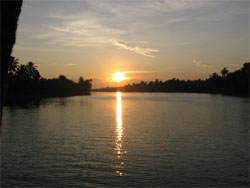 After a night's rest at Kochi, we headed to Munnar, an idyllic hill station that was transformed by the British in the 18th century into a summer escapade! Although travel websites and tour books mention a 3-hour ride into Munnar, the hilly terrain and curving roads, not to mention the potholes, make this a much longer ride.
After a night's rest at Kochi, we headed to Munnar, an idyllic hill station that was transformed by the British in the 18th century into a summer escapade! Although travel websites and tour books mention a 3-hour ride into Munnar, the hilly terrain and curving roads, not to mention the potholes, make this a much longer ride.
After we arrived at our destination, we were informed that the trade union bodies had called for a statewide 'bandh' beginning midnight and lasting for 24 hours! We had two options; either to stay put in Munnar for an extra day or drive down immediately to our next destination, Thekkady. We chose the latter option and did not regret it!
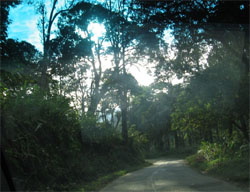 Munnar is an absolutely idyllic retreat situated in the hills at an altitude of 6000 feet and you can feel the fresh crisp air. As you drive up and down the rolling hills, you pass by several tea plantations and see the workers snipping tea leaves.
Munnar is an absolutely idyllic retreat situated in the hills at an altitude of 6000 feet and you can feel the fresh crisp air. As you drive up and down the rolling hills, you pass by several tea plantations and see the workers snipping tea leaves.
The panoramic views that this place offers is simply a feast for the eyes and you end up making several stops to capture the stunning greenery in the rolling hills and valleys set against the background of blue azure skies. We also passed by a few breathtaking waterfalls.
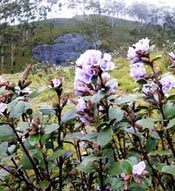 A characteristic unique to Munnar is the Neelakurinji flower which blooms only once in twelve years and we missed it by just a few weeks!
A characteristic unique to Munnar is the Neelakurinji flower which blooms only once in twelve years and we missed it by just a few weeks!
(The image of Neelakurinji shown to the left is provided by the editor)
The winding roads take you through a mangrove of overwhelming trees, which form a canopy to let the rays of the setting sun filter through the thick growth. Further down, neatly dressed school children in uniform wade through a single file headed back home after a hard day's toil. Darkness sets in early during winter and hence it is not advisable to drive late in the evenings. A cool winter shower greeted us as we neared the jungles of Thekkady, where we planned to stay at Aranya Nivas, a KTDC (Kerala Tourism Development Corporation) resort located bang in the middle of the Thekkady sanctuary. Surrounded by lush foliage and giant teak trees, you wake up to the beautiful sound of babblers and parakeets.
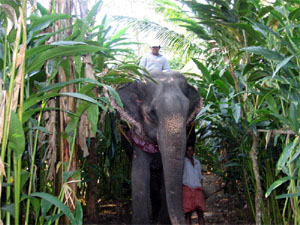 Thekkady is probably the only sanctuary in India where you can view wildlife by boat. The boat jetty is located a few paces down from the hotel and an early morning cruise in Jal Tarangini on the Periyar lake offers stunning view of the mountainside and the lush green forests nestled within.
Thekkady is probably the only sanctuary in India where you can view wildlife by boat. The boat jetty is located a few paces down from the hotel and an early morning cruise in Jal Tarangini on the Periyar lake offers stunning view of the mountainside and the lush green forests nestled within.
Thanks to the Maharaja of Travancore, a true conservationist, these forests were turned into a sanctuary in the early 20th century. One can spot sambar deer, herd of wild boars, otters, Niligiri langur, cormorants, darters or snake birds, drongos, Brahmini kites and grey heron as the boat surfs up the lake till it reaches the Periyar dam and then circles back to the jetty. Later in the afternoon we crossed another part of the lake on a wooden raft and alighted for a brisk nature trek in the jungles and to do some birdwatching.
As it had rained the previous night, the path was infested with leeches and although our guide ensured that we all had the right protective foot gear to ward the blood sucking creatures off, this trek is not recommended for the faint hearted. Of course, we were disappointed to not spot any wild elephants, which tend to come to the lakefront during the months of March/April when the waterbed is low. So we settled down instead for an elephant ride through spice plantations as the tusker skillfully navigated through tall trees, giving it a surrealistic feeling of wading through the jungle.
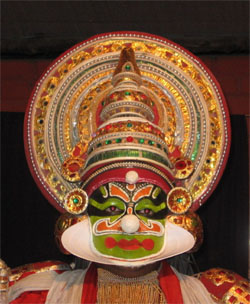 We then proceeded to watch a fine rendition of Kathakali at the Mudra Kathakali Center.
We then proceeded to watch a fine rendition of Kathakali at the Mudra Kathakali Center.
The setting is in a rather small room which makes it all the more fascinating as you can watch the artistes put on their make-up and costumes and tranport you to a world of mime, poetry and music that is absolutely riveting.
The following morning after a brisk invigorating walk through the woods, we set off for a guided tour at Abraham's spice plantation.
Thekkady is the spice capital of the world and here you get to see cardamom, nutmeg, ginger, pepper, cinnamon, clove, vanilla, jasmine, coffee, jackfruit trees in abundance.
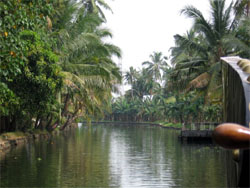 We then set off through more winding roads and hills to the sleepy little town of Kumarakom, where we stayed at a resort on the Vembanad Lake, which happens to be the largest lake in Kerala. You can perch down on the lakefront and with pin drop silence all around; one can take in all the beauty and splendor of the setting sun as it gradually disappears into the horizon! The tranquility and quietude calls for a very quiescent experience and the only sound you hear are the waters lapping at the shore and the chirping of birds, which makes it truly magical.
We then set off through more winding roads and hills to the sleepy little town of Kumarakom, where we stayed at a resort on the Vembanad Lake, which happens to be the largest lake in Kerala. You can perch down on the lakefront and with pin drop silence all around; one can take in all the beauty and splendor of the setting sun as it gradually disappears into the horizon! The tranquility and quietude calls for a very quiescent experience and the only sound you hear are the waters lapping at the shore and the chirping of birds, which makes it truly magical.
Daybreak is absolutely charming as the sun gracefully rises and you can hear the solitary fisherman singing and paying homage to the gods to ensure a bountiful catch. Early in the morning, we then went on a small boat to the Kumarakom bird sanctuary and trekked in the marshes to spot wildlife. We saw plenty of aquatic birds and fishermen who are out there early at dawn in their special boats which they propel forward using long pole-oars! It is a wonderful experience to see a whole flock of cormorants take off in the wide expanse of the lake and it is equally enchanting to see a solitary heron resting on a branch amidst the placid waters.
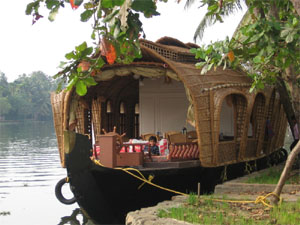 The ride from Kumarakom to Allapuzha (Alleppey) was a short one and you pass through several rubber plantations in the Kottayam district. We reached the jetty in Finishing Point just before noon and were greeted by the crew of our houseboat. We set sail shortly after noon and the captain of the houseboat introduced the rest of the crew that included two excellent cooks and a general help. The houseboat was called 'Dreamboat II' and at 91' long was equipped with two rooms, excellent bath facilities, a living/dining room, kitchen, electricity and a fine perch on the front deck right behind the captain. Houseboats or Kettuvalloms were historically used to transport rice and other commodities. The backwaters of Kerala offer you an enchanting view into the lives of the townsfolk as you totally wind down and relish the green landscape littered with swaying coconut trees on either side and enjoy the cool breeze as the houseboat merrily plods along. Dubbed as the Venice of India, this is truly an awesome way to experience the splendor of Kerala.
The ride from Kumarakom to Allapuzha (Alleppey) was a short one and you pass through several rubber plantations in the Kottayam district. We reached the jetty in Finishing Point just before noon and were greeted by the crew of our houseboat. We set sail shortly after noon and the captain of the houseboat introduced the rest of the crew that included two excellent cooks and a general help. The houseboat was called 'Dreamboat II' and at 91' long was equipped with two rooms, excellent bath facilities, a living/dining room, kitchen, electricity and a fine perch on the front deck right behind the captain. Houseboats or Kettuvalloms were historically used to transport rice and other commodities. The backwaters of Kerala offer you an enchanting view into the lives of the townsfolk as you totally wind down and relish the green landscape littered with swaying coconut trees on either side and enjoy the cool breeze as the houseboat merrily plods along. Dubbed as the Venice of India, this is truly an awesome way to experience the splendor of Kerala.
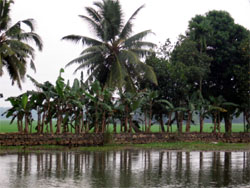 The houseboat is then parked along beautiful green paddy fields and tethered to a coconut tree. The aroma of freshly prepared food beckons you as lunch is served with a bit of pomp and 'lan. The houseboat makes several stops along the way and you can get down and visit some of the landmarks such as the Champakulam snake boat which has takes part at the annual boat races during the Onam festival, a 1000 year old Church and a number of shops selling trinkets, brass lamps and other novelties. Along the way there are quite a few 'boat stands' where passengers wait to catch the next ride either to cross the river or go further down.
The houseboat is then parked along beautiful green paddy fields and tethered to a coconut tree. The aroma of freshly prepared food beckons you as lunch is served with a bit of pomp and 'lan. The houseboat makes several stops along the way and you can get down and visit some of the landmarks such as the Champakulam snake boat which has takes part at the annual boat races during the Onam festival, a 1000 year old Church and a number of shops selling trinkets, brass lamps and other novelties. Along the way there are quite a few 'boat stands' where passengers wait to catch the next ride either to cross the river or go further down.
As dusk approaches the houseboat comes to a slow halt and is finally anchored at Lake Pampa. You are surrounded by water and lush greenery everywhere and the tranquil ambience allows you to catch beautiful glimpses of the setting sun. No wonder this has been called God's own country! Candlelight dinner on the houseboat is a wonderful experience although you do have some unexpected visitors who come buzzing around attracted by the light. As the boat sways gently in the placid waters, it is pitch black outside and it is time to call it a day.
After a good night's rest, you wake up before the sun is up and hasten to the front end of the boat to witness daybreak. This is an absolutely spectacular phenomenon for city breds as you blend in with Mother Nature and relish the sunrays reflecting off of the lake's waters. Soon breakfast is served in traditional Kerala style and it is time once again to set sail and enjoy the final few hours of the boat ride before disembarking back at Allapuzha. The twenty-two hour houseboat ride was certainly the most memorable experience we had, thanks to a fine crew that kept us engaged and entertained. We were back on the road to face the noise and traffic jams as we headed towards Guruvayoor to visit the famous Krishna temple and the adjoining beautiful Mammiyoor temple which is home to Shiva!
07-Jan-2007
More by : Subra Narayan